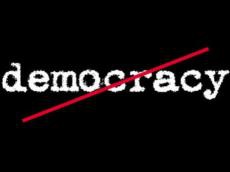|
|
TODAY.AZ / World news
Democracy between oppression and regression in Armenia
17 April 2015 [19:19] - TODAY.AZ

/By AzerNews - Mushvig Mehdiyev
Democracy in Armenia remains a foreign concept. Actually one could argue that democracy has regressed in this South Caucasus country, explained a well-known politician in Armenia while commenting on the European Union's remarks on Armenia's democratic progress.
In its annual report the European Union established that Armenia had made very little progress in the spheres of democracy, human rights and fundamental freedom in 2014. The report was published last month.
Head of the parliamentary faction Armenian National Congress, Levon Zurabyan said the EU could have directly confirmed aggravated human rights in Armenia instead of reporting about the "limited democratic progress" the country made.
"Surprisingly, the EU observes little and limited progress in Armenia' democracy. It appears that the EU is holding a very moderate view of Armenia's democracy," he said.
Zurabyan slammed the report for its tiptoeing around Armenia's real issues - human rights violations, political repression and so on.
"The authorities used various kinds of persecution against the political class. Attacks on the Prosperous Armenia and the Armenian National Congress parties, as well as a severe crackdown on the Founding Parliament movement stand perfect testimonies of authority’s repressive policy," he said.
Zurabyan categorically opposed the EU's fixation with painting Armenia as developing new democracy. He believes that the situation "is bad enough in the country in regard to human rights" for anyone to want to portray the country as moving forward.
Armenia's key governance challenge is the lack of genuine checks and balances. This has lead to serious deficits in the consistent application of the rule of law, warned the United States Agency for International Development.
Governance is based on the consensus of elite groups, leaving little room for civic input to legislative processes and policy formation. Across all sectors, laws and regulations are often poorly implemented.
Moreover, citizens in Armenia have low levels of trust in governance institutions and NGOs, while the civil society has been atomized - heavily donor dependent, and not widely seen as representative of the public’s interest, USAID insists.
As for the Freedom House, an independent watchdog organization in Washington, a semi-consolidated authoritarian regime prevails widely in Armenia, limiting the prospects of national democratic governance, civil society, electoral process, judicial management alongside fueling corruption inclinations
URL: http://www.today.az/news/regions/139956.html
 Print version
Print version
Connect with us. Get latest news and updates.
See Also
- 20 August 2025 [22:50]
Pope Leo XIV plans 1st overseas visit to Lebanon, possible stop in Turkiye - 20 August 2025 [21:50]
Putin and Erdogan discuss US-Russia Summit in phone call - 19 August 2025 [23:30]
Archaeologists uncover 1,600 year old mosaic highlighting care for the elderly in Byzantine city - 19 August 2025 [22:25]
Researchers discover natural way to clear harmful proteins from aging brain cells - 19 August 2025 [21:50]
At least 13 dead after torrential rains hit northern China - 19 August 2025 [20:21]
Zelensky signals readiness to meet Putin amid renewed push for conflict resolution - 19 August 2025 [18:15]
Baku Flow: Early September in Baku to be as hot as red pepper - 18 August 2025 [23:27]
Tesla slashes monthly lease prices in UK, offering discounts to boost sales - 18 August 2025 [20:19]
Azerbaijan surpasses self-employment targets through World Bank partnership - 18 August 2025 [19:31]
Situation remains complex as Russia continues offensive, says Ukraine’s Chief Commander
Most Popular
 Ukraine expresses gratitude to Azerbaijan for continuous humanitarian support
Ukraine expresses gratitude to Azerbaijan for continuous humanitarian support
 Archaeologists uncover 1,600 year old mosaic highlighting care for the elderly in Byzantine city
Archaeologists uncover 1,600 year old mosaic highlighting care for the elderly in Byzantine city
 Baku Flow: Early September in Baku to be as hot as red pepper
Baku Flow: Early September in Baku to be as hot as red pepper
 Researchers discover natural way to clear harmful proteins from aging brain cells
Researchers discover natural way to clear harmful proteins from aging brain cells
 Zelensky signals readiness to meet Putin amid renewed push for conflict resolution
Zelensky signals readiness to meet Putin amid renewed push for conflict resolution
 At least 13 dead after torrential rains hit northern China
At least 13 dead after torrential rains hit northern China
 Putin and Erdogan discuss US-Russia Summit in phone call
Putin and Erdogan discuss US-Russia Summit in phone call
